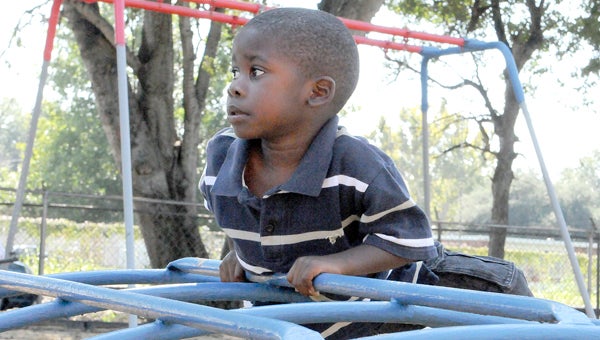Early Intervention helps family work through challenges
Published 12:55 am Saturday, October 6, 2012

Miles Knox, a three-year-old in the Head Start program, overcomes little obstacles everyday as a special needs child. Things like going to church or taking a bath are extremely tough on his family because of his autism, but with the help of the Early Intervention program, the family has been given tools and resources they said they do not take for granted. --Ashley Johnson
Charlotte Knox found herself searching for a job, settling into a new environment, and trying to find answers to why her son was acting the way he did. After her husband lost his job the family had to relocate to Selma and move in with Charlotte’s parents. At the same time the family was welcoming a new baby, Marley, when their son, Miles, suddenly started to act different.
“That’s the day I will never forget because Miles stopped talking,” Knox said about when Marley came home from the hospital in September 2010. “We thought his digression was due to the new sibling. He started hollering and temper tantrums were worse than ever and we felt it was because of Marley.”
And like many parents, Knox kept working with her son on her own dismissing his irregular behavior until a friend suggested she take him to the Early Intervention Program in the Cahaba Center in Selma.
“They took our information and I was immediately contacted by the staff here,” She said.
Early Intervention is a program designed to help families with children from birth to three years of age, diagnose and develop a plan if there are developmental issues in the child.
“Early Intervention is for children that have diagnosed conditions or developmental delays. A diagnosed condition could include Down syndrome, cerebral palsy, spinabifida —things that we know that are definite to cause a delay,” said Kimberly Olds with the Early Intervention Program. “Normally kids don’t really get a mental diagnosis until later so at a young age we mostly recognize physical delay. And the mental comes later on.”
Once Knox brought her then two-year-old son Miles into the program, the resources started to come her way. The program is a home-based program bringing resources to the family.
According to Olds, they have occupational therapists, speech therapists and even physical therapists that arrive at the home of the child to work with them in their natural environment. For Miles they were able to solve some of the communication issues that come with him having autism.
“The program not only serviced miles but it serviced all of us it helped by bringing a special educator into our home to show me things to do because I was not aware of things that I could do for Miles,” Knox said.
She said it is difficult for Miles to express his wants, such as meal options.
“They suggested that I make choices, so what I did was I cut up the box tops of the oatmeal and the grits and I presented them to him each morning and he would point to which one he would want,” Knox said. She listed many of the unusual ways like sign language and picture boards that Early Intervention suggested to her to help her communicate with her son.
Olds said the program has all sorts of equipment and gadgets they either loan or give to families. For Miles he was a able to use picture board technology for his mother to show him to aid in toilet training.
At three years-old Miles is now in the Head Start Program where he gets to interact with other children and continue developmental training. He is also in several other programs with the Selma City Schools and that is because Early Intervention set it up.
“We have a transition process where we sit down with the parents and go over all of the resources they have available to them after Early Intervention,” Olds said who also mentioned that the Early Intervention program was completely free of costs even to those with or without insurance.
“The program was really a strong hold for our family. The staff welcomed us with open arms and they helped us transition and they helped us settle in Selma,” Knox said. “I am very humbled and appreciative for everyone that has been working with us.”
Knox said that one of the family’s biggest obstacles with Miles was bringing him to church without him melting down and crying. Last week Miles was able to walk up to children’s church for the first time — even though it was just for a minute. For Knox and her family it is little milestones and baby steps with Miles and his autism that bring them joy. Moments like when he was able to shake Sparky’s hand at the Mayor’s charity luncheon or when he got on the school bus for the first time and he and his mother were crying. But for those little moments Knox said she has Early Intervention to thank.




